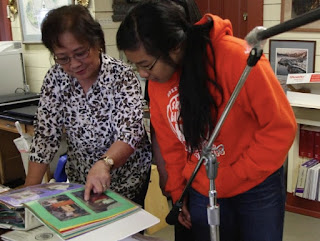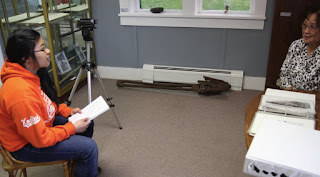 This is a guest post from a former student, Kyla Villaroya. I recently asked her for a testimonial, and instead she sent me her college essay, which unbeknownst to me explored her experience during a Baranov Museum film intensive on Filipino Community Stories. Her writing is as beautiful as her spirit!
This is a guest post from a former student, Kyla Villaroya. I recently asked her for a testimonial, and instead she sent me her college essay, which unbeknownst to me explored her experience during a Baranov Museum film intensive on Filipino Community Stories. Her writing is as beautiful as her spirit!
For
two productive weeks, I worked on gathering documents and creating
documentaries on Philippine history to be archived. I conducted interviews with
Filipino community members and scholars on Kodiak Filipino history in general,
while also paying
attention to the main topic of my film: the Filipino-AmericanAssociation of Kodiak Island. Digging into newspaper and photograph archives, I
uncovered what was a poorly documented story in Kodiak. I then used these
sources to craft a short, informative documentary. To expand my knowledge
further I read books about ethnographic methods and the history of
discrimination that Asian Americans have experienced in Alaska and United
States.
While
in the class, I shared my personal stories of immigrating to the US from the
Philippines at five years old and the discrimination my family and peers felt
as Asian-Americans. I gained the courage to use my own experiences to draw
parallels between what we were learning about history and what immigrants
experience today. My classmates were inspired by my journey that they even
incorporated it into their own films! The film intensive also provided self-confidence
to ask evocative and challenging questions of my interview subjects. For
instance, I remember asking an interviewee on the brutal murder of a localFil-Am Association leader in the 1990s- a topic that most people shy away from,
but one I thought to be an important aspect in their history.
I
even changed the subject of my film. I was tasked with exploring history of the
Fil-Am Association of Kodiak, but after beginning the interviews I determined
that looking at
only one Filipino organization wasn't enough. Instead, I
highlighted three different Filipino associations in Kodiak, producing a film
that was later displayed in the “Filipino Community Stories” exhibit.
After
the film intensive I became a regular volunteer at the Kodiak Baranov Museum. I
spent my summer with Marie and Anjuli sorting new materials and transcribing
interview footage. Through my volunteer work I discovered one interviewee in
particular, one of the earliest Filipino residents in Kodiak and the well-loved
janitor of my elementary years: Felix Canete. I sought to continue his story
which turned into a project solely on Felix’s journey to America.
My
time working one-on-one with Marie and Anjuli allowed me to use my curiosity as
a way to serve my community. During these times, both Anjuli and Marie spent
countless days working one-on-one to assist me. They took time off work to
accompany me when I traveled to Felix’s residence for interviews. Every morning
they always had new resources I
could contact, new leads to research, and readings
that pertained to my topic. Because of
their dedication to me as a student and my community’s enthusiasm for the
stories I was producing, I really excelled in the social studies. I am beyond
grateful for instructors like them. My passion I cultivated with this
experience lead me to shining in the next years of high school.
I
am currently a freshman at D’youville College in Buffalo, New York on my way to
becoming an Occupational Therapist. Just like how I explored and restored an
aspect of the Kodiak’s community history through the Baranov Museum, I will
restore the capabilities of my patients and uncover their personal stories as
an Occupational Therapist.





